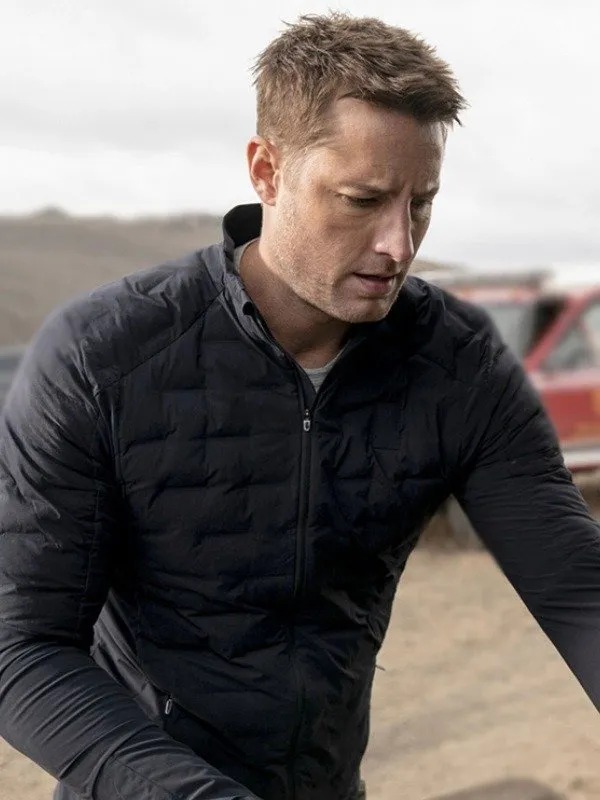
Colter Shaw (Justin Hartley) could never really leave well enough alone. For over two decades, the self-described lone wolf survivalist was convinced that his estranged older brother, Russell (Jensen Ackles), had pushed their father, Ashton — who had been paranoid about government surveillance and had forced them to live off the grid — off a cliff on a rainy night in the woods. But over the course of two seasons on the CBS drama Tracker, Colter slowly began to unravel the mystery that had torn his family apart, leading to a devastating family secret that implicated his own mother, Mary (Wendy Crewson).
In Sunday’s Season 2 finale, Colter returns to Echo Ridge, the California town where he grew up, to investigate the disappearance of a local diner owner (Brian Keane). After cobbling together enough information from a series of interviews with locals he has known since he was a child, Colter quickly discovers that the diner owner had been murdered after stumbling upon a child trafficking ring, which had been using the sleepy town as a kind of pit stop. Colter is ultimately able to stop the young victims from being smuggled away late one evening, but he has an even more personal reason for going after Carl Murphy (Shane Leydon), the perp who had killed the diner owner.
As it turns out, during his investigation, Colter had stumbled upon Carl’s trailer and found a carving of a wolf with the name “Ashton” scratched on the bottom. Under serious threat of bodily harm, Carl revealed that he had gotten that carving from his uncle Otto Waldron (Alex Fernandez), who had helped the Shaws live off the grid by installing their wind turbines. In the heart-pounding final scene, Colter arrives unannounced at Otto’s front door and, once inside, holds Otto at gunpoint, forcing him to confess that he was the mysterious man who had pushed Ashton off that cliff — but only at the request of Mary, who had clearly grown uneasy at the thought of Colter finding out the truth in the present day.
Below, executive producer and showrunner Elwood Reid breaks down how that satisfying cliffhanger sets the stage for Season 3 (which will consist of 22 episodes), why he is committed to further developing the characters on Colter’s team, and why he believes executive producer and star Hartley is the key to the success of Tracker, which is now the most-watched show on network TV.
Justin has spoken recently about how important it has been for Colter to evolve over the course of these first two seasons. He’s gone through a lot of emotional turmoil, and the many lessons he learns on his jobs tend to stick with him. How have you seen Colter’s evolution, and what new layers did you find in the writing of the character this season compared to the first?
Elwood Reid: I think one of the things with Justin as an actor — I say this all the time with him, and I think it annoys him — he does have, I know this sounds weird, that Clint Eastwood element where he doesn’t have to say very much, but there’s a lot there [in a single look]. But then when we do decide to open him up emotionally, he’s got all these gears that are there. I think the show really works well when we keep him stewing on something, and in this season in particular, we started out with this [story] about his past with his girlfriend’s sister going missing and this thing that haunted him [for 10 years], and we got to see how that reflected in his other relationships.
But there’s the big unanswered question from the pilot: What happened with his family? What happened to his father that night? We’ve seen him talking to his sister and his brother, and they don’t quite get the straight answer. Reenie’s asked him about it. Bobby’s asked him about it. I think one of the things that makes this show successful is keeping those secrets pretty well guarded with Colter, so when we do get pieces of them, the audience feels like they’re earned. It’s not just like he’s babbling in therapy every week, because he’s not a guy that talks about his feelings. So when he does, it’s meaningful. We all have, and I speak for myself, messed-up families. Families are complicated, and I think you take that into the world with you, whether you choose to put a mask on or not.

I think Colter’s really good at [hiding] it, but I think there’s something that comes through when he’s talking to these people that he’s going to help. They sense someone who’s a fellow traveler; they sense that there’s a human being behind this good-looking guy that comes through their door and says, “I can help you find your daughter, your brother, your mother, your husband.” Justin does all that intuitively and without asking. You’d laugh if you saw some of these scripts. He has almost no dialogue. We just take it away because I don’t need it with him. He can do it with the look. There’s something internal with him that I’ve not experienced with a lot of the actors I’ve worked with.